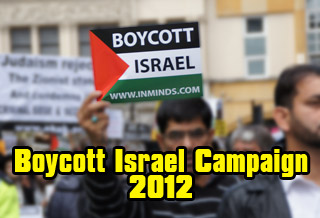
 Innovative Minds © 2014. All Rights Reserved. www.inminds.co.uk | ||||
|
Comment: In 1977 the US introduced "antiboycott laws" to protect Israel by "encouraging" US firms exporting to Muslim countries not to participate in the boycott of Israel that was initiated by the Arab League. Whilst it doesn't effect consumer boycotts of Israel, but never the less, its interesting to see how American laws are enshrined to protect Israeli interests above US interests. Needless to lay, there are no such reciprocal laws in Israel favouring the US. US fines firm for selling to Pakistan without reportMichael Freund, The Jerusalem Post The US government has imposed a civil penalty on a prominent Texas-based firm for violating American legal strictures related to the Arab boycott of Israel. In a settlement announced on Friday, Dresser Incorporated, a multi-billion dollar manufacturer of energy infrastructure equipment, agreed to pay $9,000 in civil fines to settle charges leveled against it by the US Department of Commerce's Bureau of Industry and Security (BIS). The bureau, which oversees enforcement of US anti-boycott regulations, had alleged that "from January 2001 through January 2004 Dresser failed to report in a timely manner its receipt of nine requests to engage in a restrictive trade practice or boycott," according to a BIS release. Various Muslim and Arab states regularly ask foreign firms to supply documentation attesting that they have no business or financial ties to Israel. US law requires American companies to report requests for such information to the Commerce Department. In Dresser's case, the transactions in question all involved the sale of goods to Pakistan, which imposes restrictions on trade with Israel. The company did, however, voluntarily disclose the violations to the government, which acknowledged that Dresser had "cooperated fully with the subsequent investigation." "Although the company never took any action nor participated with any requests received, we had some situations where some of our employees did not timely report having received these requests, and therefore we did not inform the government within the prescribed time periods," a company spokesman told The Jerusalem Post in a telephone interview. "But we have made great progress," he added, noting that a new compliance department had been established within the firm to ensure conformity with the anti-boycott regulations. "Since this discovery, the company has timely filed its boycott reports, as required by the regulations," the spokesman said.
BUREAU OF INDUSTRY AND SECURITY: Texas Company Settles Charges Of Antiboycott ViolationsBureau Of Industry And Security FOR IMMEDIATE RELEASE BUREAU OF INDUSTRY AND SECURITY Friday, July 20, 2007 Office of Public Affairs www.bis.doc.gov 202-482-2721 TEXAS COMPANY SETTLES CHARGES OF ANTIBOYCOTT VIOLATIONS WASHINGTON -- The U.S. Department of Commerceâs Bureau of Industry and Security announced today that Dresser Incorporated (Dresser), located in Texas , has agreed to pay a $9,000 civil penalty to settle allegations that it violated the antiboycott provisions of the Export Administration Regulations (EAR). "The Department of Commerce stands firm in its policy of opposing restrictive trade practices or unsanctioned boycotts, including against Israel . We will vigorously pursue those who violate the antiboycott regulations," said Darryl W. Jackson, assistant secretary of Commerce for Export Enforcement. The Commerce Departmentâs Bureau of Industry and Security (BIS), through its Office of Antiboycott Compliance, alleged that from January 2001 through January 2004 Dresser failed to report in a timely manner its receipt of nine requests to engage in a restrictive trade practice or boycott. The company voluntarily disclosed the transactions and cooperated fully with the subsequent investigation. The transactions involved the sale of goods to Pakistan . The antiboycott provisions of the EAR prohibit U.S. persons from complying with certain requirements of unsanctioned foreign boycotts. Additionally, the EAR requires that U.S. persons report their receipt of certain boycott requests to the Department of Commerce. Source: http://www.bis.doc.gov/news/2007/texas07202007.htm
US amends strictures on Arab boycottMichael Freund, The Jerusalem Post The US government has recently revised its federal antiboycott statutes, which prohibit American companies from cooperating with any Arab trade embargo of Israel. The changes, which take effect on August 16, amend existing penalty guidelines and outline the procedure for firms wishing to come forward and voluntarily disclose violations of the law. Officials hope that by providing exporters with new incentives to come clean regarding noncompliance with the rules, it will preclude the need for lengthy, and often costly, investigations. A spokesman for the US Commerce Department's Bureau of Industry and Security (BIS), which oversees enforcement of the antiboycott laws, told The Jerusalem Post via e-mail that the revised guidelines will "provide US businesses with a clear understanding of the procedures BIS uses to settle alleged violations of the antiboycott provisions." The spokesman said the US government "anticipates the new statute will provide a well-defined process for the self-disclosure of violations and may thus encourage self-disclosures." He added that the antiboycott laws would continue to be enforced "with diligence and vigor." The revisions have been in the works for nearly a year, and were first reported in the Post in September. Congress passed an antiboycott law in 1977 prohibiting American firms from cooperating with the trade embargo, which is administered by the Arab League with the aim of isolating Israel and harming its economy. Various Muslim and Arab states regularly ask foreign firms to supply documentation attesting that they have no business or financial ties to Israel. US law bars Americans from complying with such demands and requires them to report requests for such information to the Commerce Department in a timely fashion. According to the Bureau of Industry and Security, nine US firms agreed to pay civil penalties totaling $95,950 in fiscal year 2006 to settle allegations that they had violated the statutes either by complying with boycott-related requests or by failing to report them. "The Department of Commerce policy of opposing restrictive trade practices or unsanctioned boycotts, including against Israel, is clear-cut," said Mario Mancuso, under secretary of commerce for industry and security. "Publishing the penalty and voluntary self-disclosure guidelines provides additional clarity and is a valuable part of our continuing efforts to educate US businesses about their responsibilities," he said. The Bureau of Industry and Security spokesman said that no additional changes to the law were expected any time soon. "There are no current plans to change the antiboycott provisions," he told the Post. Source: http://www.jpost.com/servlet/Satellite?cid=1185893684429&pagename=JPost%2FJPArticle%2FShowFull
Also Of InterestPage URL: http://www.inminds.co.uk/article.php?id=10189
|
|
Support Us
If you agree with our work then please support us.Campaigns INMINDS Facebook Live Feed Latest Video's
INMINDS Twitter Feed Tweets by @InmindsComFeatured Video's
You need Flash player 8+ and JavaScript enabled to view this video.
[all videos (over 200)..] Featured MP3 Podcast  "The United States is 4.6% of the worlds people but still controls 50% of the worlds wealth and has a military that spends more than every other country in the world combined. I see this moment, as a moment that is very dangerous.. which is to say that the United States is a declining world economic power, similarly a declining political power, but what isn't declining is the military power. As you know from the 20th century that's a dangerous combination - a declining economic and political power but an overwhelmingly dominant military power. I think the national security state that we've seen organised since 9-11 in an unbelievably rapid way, which owes in no small part to Israel I must say, is a particular [example]." A founding member of the Weather Underground Meeting with members of 'Smash EDO' in Tel Aviv, April 2010 [88min / 40Mb] [all podcasts..] Newsletter Feedback |
 |
 |












































